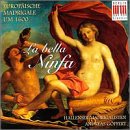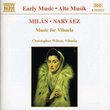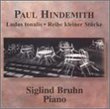| All Artists: Luca Marenzio, Giovanni Pierluigi da Palestrina, Jacques Arcadelt, Claudio Monteverdi, Carlo Gesualdo, Heinrich Schutz, Orlande de Lassus, Giovanni Giacomo Gastoldi, Francisco Guerrero, Alonso de Mudarra, Leonhard Lechner, Hans [1] Leo Hassler, Flemish Traditional, Clement Janequin, Pierre Passereau, Thomas Morley, John [1] Farmer, John Wilbye, Orlando Gibbons, John [Composer] Bennet Title: La bella Ninfa: European Madrigals ca. 1600 Members Wishing: 0 Total Copies: 0 Label: Berlin Classics Release Date: 6/16/1998 Genres: Special Interest, Pop, Classical Styles: Vocal Pop, Opera & Classical Vocal, Chamber Music, Historical Periods, Baroque (c.1600-1750), Classical (c.1770-1830), Instruments, Strings Number of Discs: 1 SwapaCD Credits: 1 UPC: 782124933623 |
Search - Luca Marenzio, Giovanni Pierluigi da Palestrina, Jacques Arcadelt :: La bella Ninfa: European Madrigals ca. 1600
 | Luca Marenzio, Giovanni Pierluigi da Palestrina, Jacques Arcadelt La bella Ninfa: European Madrigals ca. 1600 Genres: Special Interest, Pop, Classical
|
Larger Image |
CD DetailsSimilar CDs
|
CD ReviewsMust have it! Bogdan Minut | Columbus, IN United States | 04/06/2002 (4 out of 5 stars) "The European Renaissance madrigals remain an invaluable good of humanity. And this recording is another proof that the real music goes hand in hand with good performers. The madrigal, a fashionable genre of secular vocal music in the sixteenth century, has lost its consideration today. However, more and more vocal ensembles around the world have contributed to the revival of this music.
The notes of this compact disc suggest that the term madrigal may derive from the Latin matricalis, meaning "from the mother," and refers to a song in the mother tongue. However, the term might also be used in order to designate secular pieces (cantus materialis) as oppose to sacred pieces (Cantus spiritualis). In any case, the madrigal indicates a lyrical and musical form in 14th-16th century Italy. The musical madrigal used to depict the nature, but its prevalence grew and thus the genre enjoyed a huge development in the cultural life of the princely courts and academies of the Italian city-states. Here, the madrigal displayed a great stylistic variety along with several regional variations. The present recording unfolds a page of the madrigal history. The first group of pieces comes from Italy itself. Eternal "hits" such as Arcadelt's Il bianco cigno, Palestrina's I vaghi fiori, Monteverdi's Ecco mormorar l'onde and Lasciate mi morire, as well as the very chromatic Moro lasso and Dolcissima mia vita by Gesualdo stand under the very earthy concepts of nature, love, and death suggested in the title song of this compilation, Luca Marenzio's La bella Ninfa (The Beautiful Nymph). After a short stop in Spain, the "trip" goes to Germany and France. While Hassler and Lechner dominate the German region of the madrigal, Passereau's Il est bel et bon and Lasso's Bon jour, mon coeur are the well-known examples of the French direction of the secular genre, the chanson. The last section of the recording is dedicated to some of the most wonderful English madrigals, such as Morley's Now Is the Month of Maying, Farmer's Fair Phyllis, Gibbons's Silver Swan, or Bennet's Weep, O Mine Eyes. Considered by musicologists the "father" of the English madrigal, Thomas Morley inspired some other composers, among them John Bennet and John Farmer, while Gibbons and Wilbye developed a style of their own. The listener can't find any information about the vocal ensemble that performs on this compact disc, the Hallenser Madrigalisten, but references about them can be easily extracted from their web site, .... The choir, whose English name would be The Halle Madrigal Singers, was founded in 1963 in Halle, Germany by Siegfried Bimberg as a chamber choir at the Martin Luther University of Halle-Wittenberg. The 20 singers, musicologists, lecturers, students, and teachers of singing, have devoted themselves above all to the interpretation of 16th and 17th century choral music. Another omission from the CD notes is the text of the 27 madrigals including their translations. In my opinion, this may cause a limitation with regard to the general public who might choose not to buy this product whether or not they like Renaissance music. What does not miss from this CD is the crisp performance of the group. This is an excellent recorded performance, not only because it was made in a church (Paul-Gerhardt-Kirche), but also for an overall good intonation, and for a stylistically correct phrasing and rhythm. A very good vocal balance, impressive diction and pronunciation, a vigorous character alternating with more lyrical pieces make this recording worth trying. However, there are some inexplicable fast tempi in Lasso's Matona mia cara or in Passereau's Il est bel et bon. It's not specifically the fast pulse they took in these pieces that might bother the elevated listener, but the lack of the feeling that after a structural section there's no clear delimitation, such a longer rest. Also, some of the slower to medium speed pieces might be found in a better "shape" elsewhere. In conclusion, with all the pluses and minuses, the Halle Singers's collection of Renaissance madrigals remains a "must have" in any musician's personal library. I highly recommend this recording to anyone who loves Renaissance vocal music." |

 Track Listings (27) - Disc #1
Track Listings (27) - Disc #1

